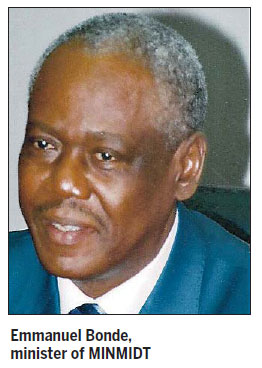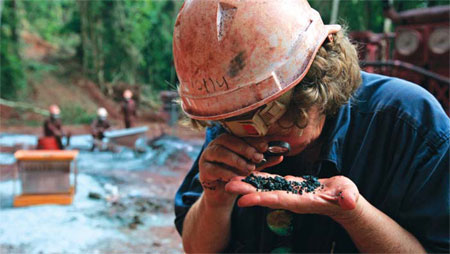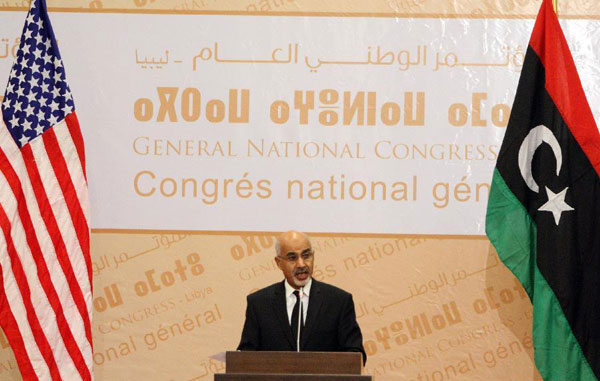Mining sector offers wealth of investment openings
Updated: 2012-09-25 08:06
(China Daily)
|
|||||||||||
|
With billions of tons of mineral reserves, Cameroon is enticing many international investors. Photos Provided to China Daily |


Ministry of MINMINDT plans to turn natural assets into real industrial opportunities
Rich in natural resources thanks to its vast mineral deposits such as gold and diamonds, Cameroon is taking advantage of its mineral wealth with the help of foreign investors, including numerous companies from Asia.
The Cameroonian government has identified the development of the mining industry as a priority in the short, medium and long term as the country strives to hit key economic goals by 2035.
Despite the global economic slowdown that affects Western countries currently, the government is determined to make the mines and geology sector a core pillar of economic growth and sustainable development. Ignored by previous administrations, the fledgling mining sector has yet to contribute much to GDP or socio-economic development, but that is now set to change with dozens of new projects in the pipeline.
The new pro-business mining code has resulted in the issuing of 100 exploration licenses and foreign direct investment is starting to flow into the sector. However, like other industries, several difficult challenges lie ahead, including limited transport network and energy supply on site.
Of course, confidence is high and all these goals will be achieved with the help and support of international investors who are eager to exploit large reserves of gold, diamonds, cobalt, iron ore, bauxite, nickel, alumina and uranium.
According to official government data, Cameroon has a billion tons of bauxite and at least the same quantity of iron ore. Titanium reserves are estimated at 300 million tons and cobalt, nickel and manganese deposits at 225 million tons.
In addition, Cameroon has oil and gas reserves that are thought to total 250 million barrels and 187 billion cubic metres of natural gas. The aggregate value of all these natural resources is more than $100 billion and at least 200,000 direct and indirect jobs could be created by their exploration, extraction and related activities. In order to attract substantial FDI to develop the sector, the government is pumping hundreds of millions of dollars into transport and energy infrastructure such as highways, ports, railways and power plants.
The Ministry of Mines, Industry and Technological Development, is responsible for developing strategies for industrial development by enhancing natural resources and mines.
Headed by Emmanuel Bonde, the ministry is reforming, developing and implementing a nationwide industrialization plan. The ministry is also facilitating geological prospecting and mining activities, local processing of agricultural products and promotion of private investment.
With support from the World Bank, MINMIDT organized the Second Forum of Cameroon Mining in Yaound from May 29 to 31, 2012, to discuss the best way for the country to maximize its mining potential. Attended by 400 industry representatives from around the world, the event included presentations and speeches from leading mining figures and government officials and highlighted areas that need substantial FDI to enable exploration. More than half of the country remains unexplored and this untapped potential needs investors in order to be revealed.
Cameroon has applied to the Extractive Industries Transparency Initiative to structure its mining industry with international standards. The request shows the determination of Cameroon's government to boost transparency over payments by mining and energy companies to public departments and agencies.
Following a series of recent sector reforms, the government's role is more focused on the organization, regulation, promotion and control of mining and petroleum activities. These forward-thinking changes were characterized by the recent establishment - with assistance from the World Bank - of modern legislative and institutional frameworks in a comprehensive new mining code.
The code offers generous tax breaks to mining investors while ensuring that Cameroon gets a fair share of the billions of dollars of minerals over the coming decades. Companies wishing to mine in the central African nation will need to prove they have adequate financing or permits will not be granted.
Meanwhile, in a further sign of the importance of the mining sector to state leaders, Cameroon recently joined the Kimberley Process on diamond certification in move that will enable production to commence at a major deposit discovered in 2008.
"Transactions in diamonds can only be possible with countries that are participants to the Kimberley accord," Minister Bonde commented during a ceremony to mark the occasion.
In an earlier speech focused on Cameroon's massive mineral wealth, Minister Bonde said: "We plan to turn these natural assets into real industrial opportunities, through a policy of integration of the industrial landscape, an increased level of processing resources locally and the establishment of basic infrastructure support such as energy and communication networks. Our target is to boost the industry to a contribution 25 percent of GDP in forthcoming years."
"My ministry has developed a program to implement technological poles over the territory corresponding to the competitive advantages of each region. Sino-Cameroonian cooperation deserves to be more diversified and strengthened; the private sector will find reliable guarantees through our investment charter and sectoral codes. Cameroon is a host of foreign productive investment, reflecting the institutional stability, an economy in constant progress and an open and democratic society."
This highly positive view is echoed by his ministerial colleague Alamine Ousmane Mey, Cameroon's Minister of Finance, who is putting in place all the various legal and regulatory frameworks that will allow mining companies to operate effectively and efficiently.
"Cameroon is well on track for development and is a country that offers peace, security and stability," Minister Mey said, "and so offers very suitable ground for fruitful investments. Our current rate of economic growth gives investors a very profitable rate of return compared to many other places in the world."
InFocus provided the story
(China Daily 09/25/2012 page19)
Editor's Picks

|

|

|

|

|

|








